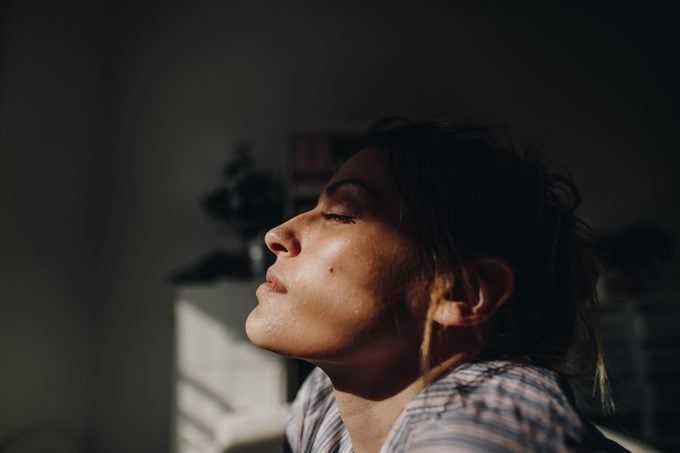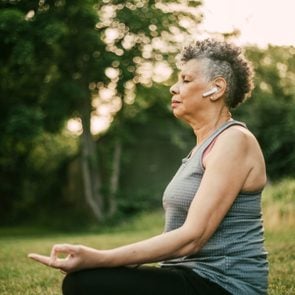Here’s How to Use Meditation for Anxiety and Restore Your Inner Calm
Updated: Jun. 02, 2021
Meditation can help manage daily feelings of stress and anxiety. Here's how to do it.
Our editors and experts handpick every product we feature. We may earn a commission from your purchases.
A rise in anxiety
We are living through stressful times, and many of us are finding solace in our daily meditation practice.
There is a lot to be anxious about given the ongoing Covid-19 pandemic, the influx of new and possibly more infectious strains, and the constant bombardment of news on the subject. About four in 10 adults in the United States have reported symptoms of anxiety or depression during the pandemic, which is up from one in 10 before the virus radically altered our lives and lifestyles, according to Kaiser Family Foundation.
And many of the hundreds of thousands of people who had Covid-19 are still feeling anxious even six months later, a recent study in Lancet Psychiatry reports. Sometimes there is a trigger, but other times anxiety can come on seemingly out of nowhere, leaving you blindsided.
“Anxiety is worry about the future, and mindfulness of or any type of meditation is about focusing on the present moment so you get some distance from those thoughts,” says Neda Gould, PhD, director of the mindfulness program at Johns Hopkins University in Baltimore.
What is anxiety?
More than just thinking that the sky is falling, anxiety also causes physical symptoms, some of which can be really scary.
Your heart can race, your breath can quicken to the point of hyperventilation, you may start to sweat or shake, and you can experience gastrointestinal problems. That’s why it’s called a nervous stomach.
Anxiety jumpstarts your sympathetic nervous system, which releases the stress hormones adrenaline and cortisol that can increase heart rate and blood pressure, but meditation can teach your body and brain how to hit pause on this response and tap into your inner calm, Gould says.
A review of 41 trials including 2,993 participants showed that mindfulness meditation programs, in particular, helped reduce anxiety, depression, and perceived stress/general distress. The study appears in AHRQ Comparative Effectiveness Reviews. Mindfulness involves paying close attention to what you are feeling in the moment.
Next time you get a breaking news alert with not-so-good news, consider taking a mindfulness break.
A recent study by researchers at Wake Forest School of Medicine in Winston-Salem, North Carolina found that one 15-minute online mindfulness session reduced in-the-moment anxiety, stress, and Covid-19 concern among people who are fearful about the ongoing Covid-19 pandemic, many of whom had never tried mindfulness before. The research appears journal Global Advances in Health and Medicine.
(Worried about the “new normal?” Here are ways to deal with post-pandemic anxiety.)

Types of meditation for anxiety
Mindfulness is one type of meditation that has proved to help with anxiety, but there are many others.
Movement meditation involves moving through various positions with a mindful or slow pace. (Think yoga, tai chi, or even just going for a walk.) Another popular type of meditation, transcendental meditation, calls for repeating a personalized mantra over and over and is practiced 20 minutes twice a day.
Appreciation-based meditations can be powerful anxiety remedies, says Cortland Dahl, chief contemplative officer at Healthy Minds Innovations and a research scientist at the Center for Healthy Minds at the University of Wisconsin-Madison.
“Appreciation is simply the skill of orienting the mind to something positive in oneself, in another person, or in one’s environment,” he explains. “Since anxiety gets our mind laser-focused on the negative, appreciation can bring in a broader perspective.”
How to practice mindfulness and appreciation-based meditation
Before you practice any type of meditation, it’s important to find a quiet place and a comfortable position (whether it’s sitting, standing, or lying down). The goal is to be free of distractions and potential interference from family, friends, roommates, or pets.
Start by closing your eyes and taking a few slow, calming breaths. Notice the sounds in your environment and how your body feels, says Dahl. Bring different people or situations to mind and notice one positive thing about each.
“You can even imagine expressing appreciation and what that would feel like to another person to be truly seen and valued,” he says.
“Combining mindfulness and appreciation in this way activates a constellation of brain circuits that promote resilience and emotional well-being,” Dahl says. “Over time, by activating these same circuits repeatedly through short moments of mindfulness and appreciation, it gets easier and easier to shift from overwhelm and anxiety to inner calm and a positive outlook.”
(These 8 mini meditations may also relieve stress and anxiety.)
Like anything else, cultivating a meditation practice takes time. If you tack it on to an existing routine, it is more likely to stick, he says. There are free apps and courses that can teach you the ropes and give you a feel for the various types of practices.
How long should you meditate to reap benefits?
“We don’t know the magic number of how long you need to practice meditation to reap these benefits,” Gould says. “It depends on the severity of the anxiety but, in some individuals, meditation can have a similar benefit as an antidepressant or antianxiety medication.”
See how meditation makes you feel. The National Center for Complementary and Integrative Health points out that meditation could cause or worsen anxiety and depression.
“Over time most people find it helps them feel calmer and more focused, and it does get easier over time,” says Diana Winston, director of mindfulness education at the UCLA Mindful Awareness Research Center in Los Angeles and the author of The Little Book of Being.
The biggest sign that you’re “doing it right” is how it impacts your life. Do you feel calmer in the day, less reactive? Is it positively impacting your relationships? Is it supporting you? If you answer yes then you are doing it “right.”
(Learn more about the science-backed benefits of meditation.)
When to see a doctor
What’s the best way to manage anxiety? Sometimes meditation is not enough to truly reduce your anxiety, Gould notes.
“There is anxiety, and then there are anxiety disorders that occur when the anxiety is impairing or interfering with your daily activities in some capacity,” she says. In these cases, medication and/or counseling may also be helpful and necessary.
There’s a growing body of evidence suggesting that meditation can help with anxiety in addition to other health benefits. Give it a try and see how it makes you feel, but if it is not enough and your anxiety is getting in the way of doing the things you want and need to do, talk to a therapist to see if you could be doing more to alleviate your fears.
Next, learn how to use morning meditation to start your day.

















